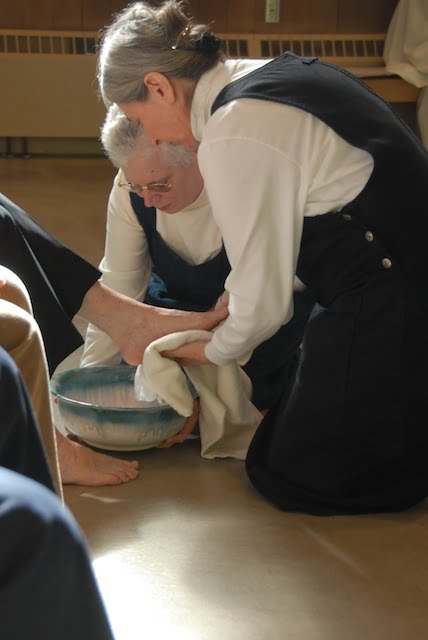In February we had conferences on John Ruusbroeck, the Flemish mystic of the late 13th / 14th century. I was struck by a question that was posed to us during the course of the week. I thought and felt then, that this question could provide a fruitful entrance into Jesus’ passion and resurrection, and even lead us into a ‘renewed encounter with Christ’, to use the expression of Pope Francis, as we interface Jesus’ life with our own. The question is this: ‘What happens when we open ourselves to love without condition?’ We can imagine that this could have been a question, perhaps expressed in different words, which Jesus addressed to his followers.
I feel this question is an important one to ponder given all that is happening in our world and the invitation of Pope Francis to a ‘renewed encounter with Christ’. To walk with Jesus, to let this question pulsate within our heart and soul, will lead us into the paschal mystery, and will reveal what Christian discipleship is all about. The sacramental life of the Church on Holy Thursday is, in many ways, at its richest and deepest. In the Eucharist we witness and participate in an embodied love as Jesus offers his life in the words: “This is my body, this is my blood given for you.” And then again in the washing of the feet, which in the gospel of John is another type of ‘Eucharist’. The words of the evangelist sum up this profound ritual: ‘He loved them to the end’.
Br. Christophe, in his journal titled Born From the Gaze of God, wrote: “Christianity is the great adventure for through it one is called by an infinite love that is, by a love that does not Called by an infinite love that asks something of us; called by an infinite love that never ceases to give us something, always. The love we receive, as we take it into our lives naturally leads us to want to do something with it…to give to others and in this way we are giving back to God. It is an amazing exchange of love: of God’s covenant, ‘My love will never leave you’ and of our ‘yes’ to follow and to live from the impulses of the Spirit, allowing God, as Mary did, to work through our lives: ‘Let it be done to me according to your word’.cease to ask and to give” (p.16).
Loving without condition: if not in small ways we will never do it in larger ways…Keep in mind during these days, Jesus’ journey with his disciples: the figure of Peter who betrays him, who often does not understand, though, still step by step he changes…James and John as they argue about who is the greatest…the rich young man, a would-be disciple, who Jesus looked at and loved and then asked him to follow: who could not quite take the leap and turns away…Such human stuff that we all know and all fall into…and yet this call of infinite love remains: whoever would follow: take up your cross and come…and how often we hear Jesus say, ‘Do not be afraid’…we are afraid…we do not know where we are being led or what we are being led into…still we have the One who goes before us…
Loving without condition involves ‘kenosis’: a kenotic opening of heart, mind, and body. Without kenosis, without this self-emptying process, whatever we do ends up being more about us than about God. To lose this self-centered, non-clinging, controlling ego, opens us up to the immensity of God’s love, to freedom. With each kenotic opening, where we ‘lose our lives’, we are lifted up as God’s love pours forth gracing us with a renewed heart and mind, giving us the capacity to serve and to be stewards of God’s mysteries, not counting the cost.
Cynthia Bourgeault, in her book, The Wisdom Jesus, wrote: “In Jesus everything hangs together around a single center of gravity, and you need to know what this center is before you can sense the subtle but cohesive power of the path he is laying out. What name might we give to this center? The apostle Paul suggests the word kenosis… ‘to let go,’ ‘to empty oneself…’” (p.63). And later she writes on this same theme: “The act of self-giving is simultaneously an act of self-communication; it allows something that was coiled and latent to manifest outwardly” (p.68). This is the humble power of kenosis: it unleashes God’s transforming love not only within our lives, surely as well, in our communities, our Church, our world.
The Eucharist and the washing of the feet: sacramental rituals that reveal and proclaim one message: He loved without condition. Last year for my Holy Thursday talk I emphasized that both these rituals, happen within the context of community. Several days ago I received a letter, which included these words of Dom Helder Camara: “When we are dreaming alone, it is only a dream. When we are dreaming with others, it is the beginning of reality”. We gather during these days as one community. As we live into the discipleship call ‘to love without condition’, let us dream together of peace for our world: a peace that begins with us as we follow Jesus, and live his embodied love, in the daily happenings of our lives and in the larger ways that this call of infinite love will continue to ask of each of us.


